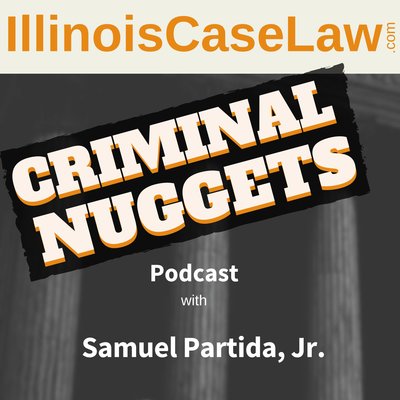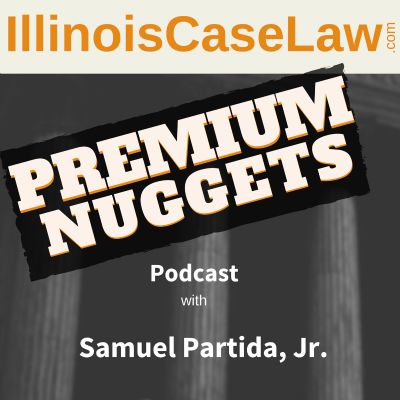Apr 28, 2015
Go to Show Notes: Click Here
Police officer conuducts a police dog sniff around a car after the business of the traffic stop was over. Was this legal or illegal?
Subscribe: iTunes | Stitcher | RSS
See Rodriguez v. United States, Doc. No. 13-9972 (04/21/2015).
Issue
Does the Fourth Amendment tolerate a police dog sniff around a car after completion of a traffic stop?
More Information on Police Dog Cases
I have put together a collection of articles and podcasts dealing with the law around drug dog issues. If you are interested on more information then you may want to also check out the following posts:
Facts: Police Dog Sniff During Traffic Stop
In this case, a K-9 Officer sees a car jerk to the right then quickly veer back into the lane. The stop occurred at 12:06 a.m.
Normal traffic stop stuff happens. The officer asks for ID from the two men in the car, asks where they going, and asks about the car jerking out the lane.
Police dog is in the car the whole time.
At 12:28 the officer gives them back their ID and gives Defendant a warning for the lane thing.
The officer asks for permission to conduct a drug sniff around the car. Defendant says “no.” Cops says “get out the car” were doing the dog sniff anyway.
Officer had already called for back-up and was just waiting for that officer to come so he could watch the two men during the sniff.
The dog alerts and the officer finds over 50 grams of methamphetamine in the car.
De Minimis Constitutional Violation
After, this case I guess I know how prosecutors feel about jury nullification.
The trial judge and the 8th Circuit Federal Appeals court both acknowledge that there was no probable cause or reasonable suspicion for the dog sniff. That in essence is a finding of a violation.
But they held that because the dog sniff occurred only 7 to 8 minutes after the completion of the traffic stop the Fourth Amendment violation was de minimis, not of constitutional significance, and therefore permissible.
You see what I mean. There were saying of course there was a violation of the Fourth Amendment here, but so what? Whats the big deal?
Traffic Stops Have a Scope Requirement
It has been well established in search and seizure law that the scope of a detention must be carefully tailored to the underlying justification for the stop. This is basic stuff.
Consistent with this notion of scope is the idea that authority for the seizure ends when the tasks tied to the traffic infraction are or reasonably should have been completed. This goes way back to Terry v Ohio, 392 U.S. 1 (1968) and Illinois v. Caballes, 543 U.S. 405 (2005).
In Caballes the Court explained that an officer may still -
-
Check Driver’s Licenses
-
Conduct Warrant Checks
-
Inspect Registration
-
Ask for Proof of Insurance
See Caballes, 543 U.S. at 408.
Also Illinois cases allow officers to ask questions about coming and goings and Illinois courts have allowed broad questions like, “Is there anything illegal in the car?”
However, these other intrusions unrelated to the traffic stop remain lawful “so long as [the unrelated] inquiries do not measurably extend the duration of the stop.” Arizona v. Johnson, 555 U.S 323, 333 (2009).
Analysis
The court acknowledged that an officer may constitutionally remove a car’s occupants during a traffic stop for officer safety concerns.
This Court said that police dog sniffs are different.
A police drug dog sniff is a measure aimed at detecting evidence of ordinary criminal wrongdoing. “Highway and officer safety are interests different in kind from the Government’s endeavor to detect crime in general or drug trafficking in particular.” See page 8 of decision.
The Supreme Court characterized the government's argument this way: They said the government was arguing that because the officer was diligent of his investigation of the traffic infraction he should be given some bonus time to pursue an unrelated criminal investigation.
The court obviously brushed that notion aside.
Officers should always be moving diligently and not delaying or prolonging traffic stops unnecessarily. Further, the constitutional requirement here is not measured in absolute time. In other words, a traffic stop that occurs in a small amount of time when compared to similar type stops can still be unreasonable if it is otherwise improperly “prolonged.”
A traffic stop prolonged beyond the time that an expeditious officer could reasonably complete the mission of the traffic stop is unlawful.
The critical question is not whether the police dog sniff occurs in a reasonable amount of time, nor whether the dog sniff occurred before or after the ticket is written, but instead the critical question is whether conducting the sniff adds time to the stop.
Holding
The case was remanded to the Eighth Circuit to see if the officer may have had an independent basis justifying the expansion of the investigation.
What I Learned
I used to think that K-9 units would be used more and more for general patrol. Get a police officer with a dog as a partner out there and they would be able to kill two birds with one stone.
Traffic stop would automatically turn into a drug investigation.
Well, after this case I can see that it is just not that easy to the dog during a “sniff” and still deal with a traffic stop.
Police dog is not a partner like a real partner. You know how one officer talks to you during a traffic stop and the other cop is just looking around, flashing his light into your back seat and that kind of thing.
Well, a police dog can’t be set free to just sniff around then report back to the handler.
Yea, man this car is hot. I smell some fresh bud in the back.
No, I guess it doesn’t work that way.



